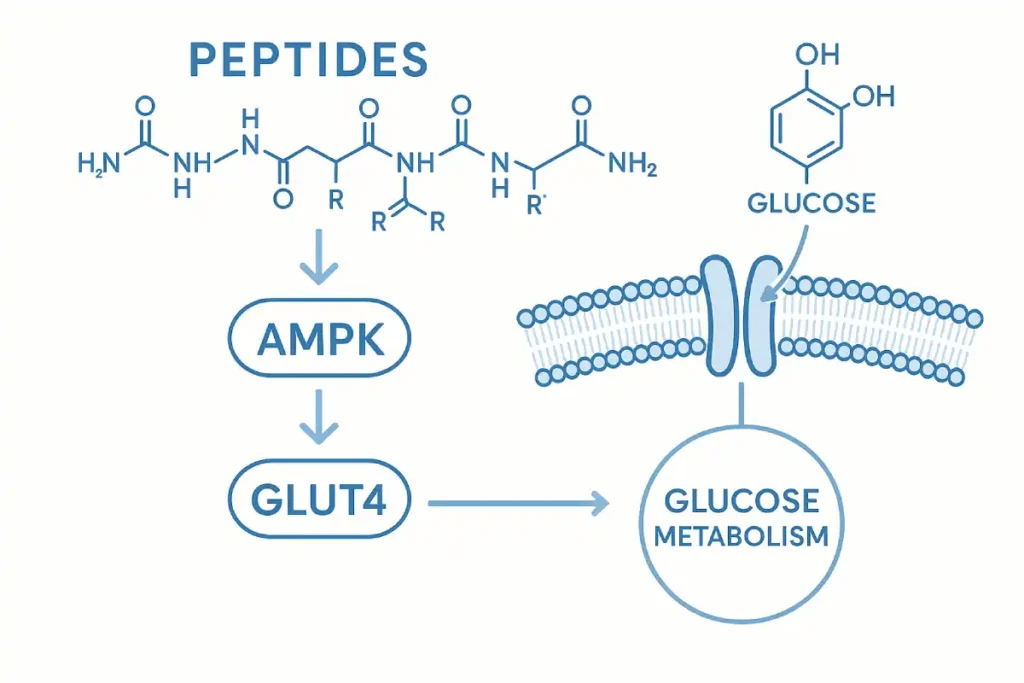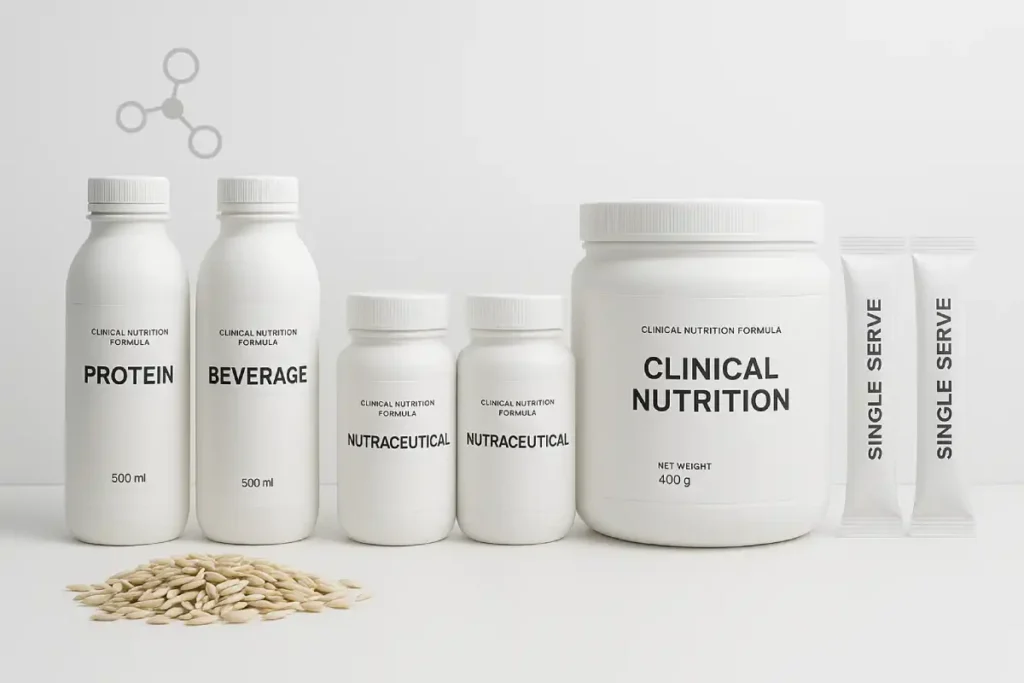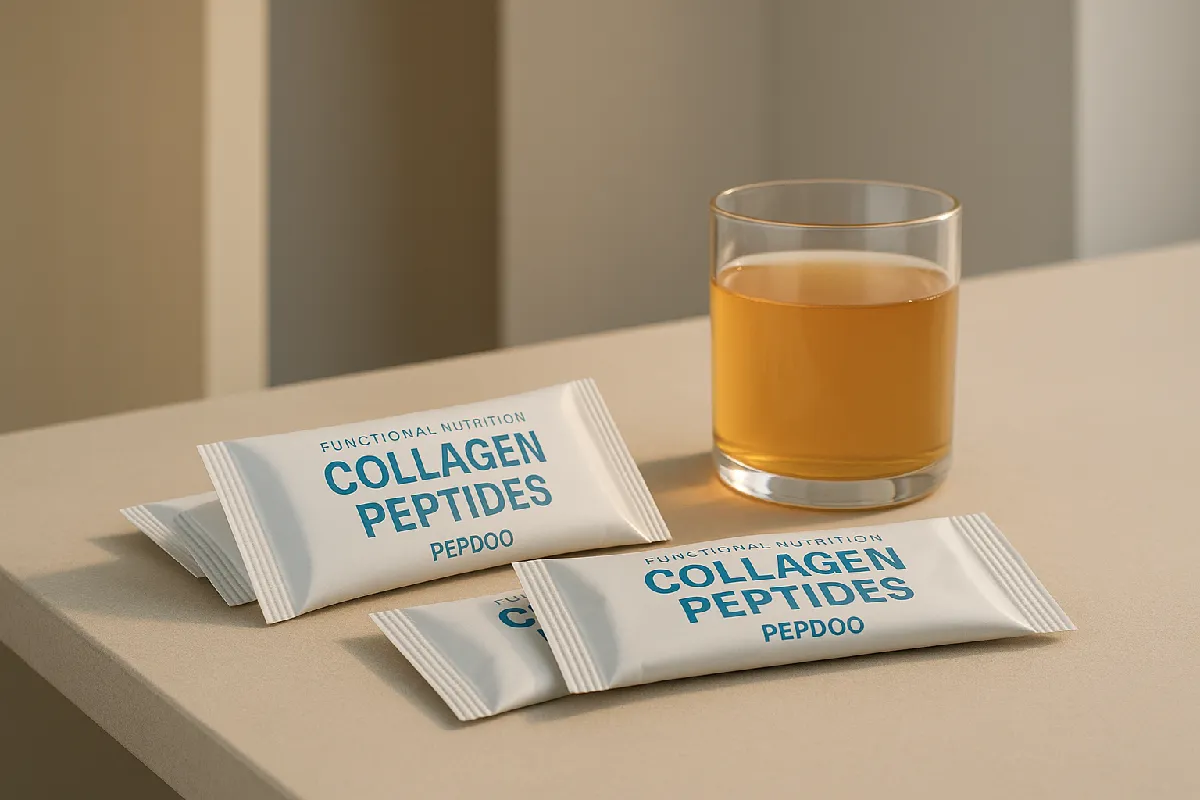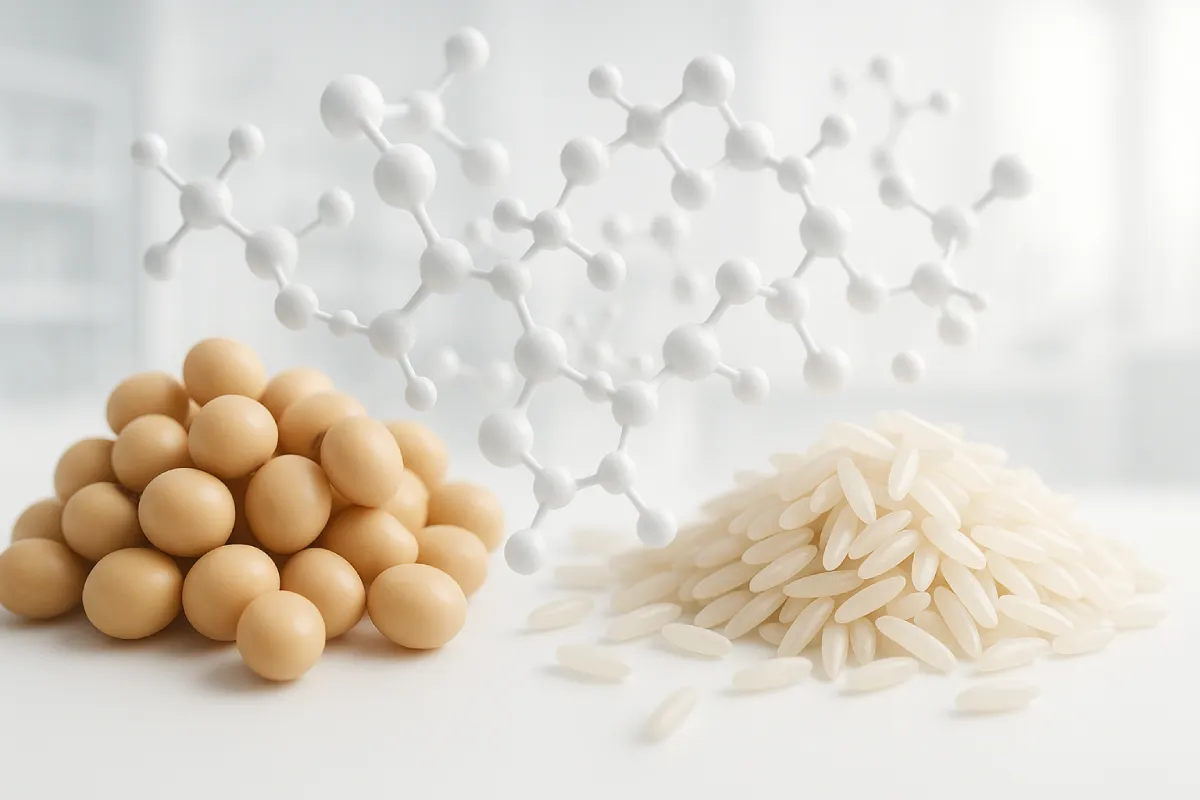The Global Rise of Precision Nutrition for Blood Sugar Management
Manufacturers and brands in functional foods, nutraceuticals, and FSMP (foods for special medical purposes) are shifting from broad “wellness” claims to precision-targeted nutritional solutions. Rising rates of prediabetes and metabolic syndrome have driven demand for ingredients that deliver measurable postprandial glucose benefits, insulin-sensitivity support, and reproducible clinical outcomes.
While oat beta-glucan (soluble fiber) remains a reliable tool for moderating glycemic response, the industry is increasingly adopting oat peptides — a class of oat-derived bioactive peptides — as complementary and, in some applications, superior functional actives for metabolic support. These oat bioactive peptides target cellular signaling and enzyme activity in ways fiber does not, enabling formulators to design lower-dosage, consumer-friendly formats with clinically relevant endpoints.

Why Oat Peptides Outperform Oat Fiber in Metabolic Support
From an R&D and product-differentiation standpoint, oat peptides offer several advantages over beta-glucan-only strategies:
- Mechanistic specificity: Beta-glucan reduces postprandial glycemic peaks by increasing gastrointestinal viscosity and slowing carbohydrate absorption. Oat peptides can additionally modulate intracellular pathways (e.g., AMPK, insulin signaling) and inhibit carbohydrate-digesting enzymes, enabling multi-layered glycemic control.
- Formulation flexibility: Achieving effective doses of beta-glucan often imposes textural and stability constraints in RTD beverages, bars, and thin-film formats. Oat peptides — when produced with controlled molecular-weight profiles and taste-masking — fit a wider range of dosages and delivery formats.
- Differentiation & claims: Brands can position “oat peptides for blood sugar control” as a premium, science-backed upgrade to generic oat/fiber positioning, supporting B2B sales conversations and private-label premiumization.
For procurement and ingredient sourcing, this means engaging an oat peptide manufacturer or oat peptide supplier that can deliver: well-characterized peptide fractions, low bitterness, consistent batch-to-batch molecular-weight distribution, and documentation suitable for regulatory and clinical work.
Science Behind Oat Peptides: How They Support Glucose Metabolism & Insulin Sensitivity
Oat bioactive peptides (derived from enzymatic hydrolysis of oat proteins such as globulins and avenins) display multiple mechanisms relevant to glucose control:
- Enzyme inhibition: Certain oat peptide fractions inhibit carbohydrate-digesting enzymes (α-amylase, α-glucosidase), which slows conversion of complex carbs into absorbable sugars, reducing postprandial glycemic spikes.
- Insulin signaling & glucose uptake: Preclinical studies indicate that food-derived peptides can activate AMPK and enhance GLUT4 translocation in muscle cells, improving peripheral glucose uptake and insulin sensitivity — a pathway directly relevant to postprandial clearance and long-term metabolic health.
- DPP-IV and incretin modulation: Some oat peptide fractions show activity against DPP-IV, which could indirectly support incretin levels and glucose homeostasis (preclinical signal; further clinical study warranted).
- Anti-inflammatory & antioxidant effects: Chronic low-grade inflammation impairs insulin signaling. Oat peptides often exhibit antioxidant and anti-inflammatory bioactivities that contribute to improved metabolic function over time.
Practical takeaway for R&D: prioritize oat peptide ingredients with peer-reviewed or manufacturer-provided bioactivity data (in vitro enzyme assays, cell-based AMPK/GLUT4 data, and — ideally — in vivo glycemic outcomes). A supplier who can provide molecular-weight profiling (e.g., % <1 kDa), LC-MS peptide IDs, and stability data will accelerate regulatory and clinical planning.
Key Functional Benefits for Functional Food and FSMP Brands
For B2B product teams, oat peptides open the door to:
- Improved postprandial glycemic profiles in low-GI products and meal replacements.
- Smaller effective dosages compared with fiber-only strategies, enabling thinner RTD and on-the-go formats.
- Synergistic formulation with chromium, myo-inositol, plant polyphenols, and probiotics to create multi-modal metabolic formulas.
- Consumer-friendly claims (e.g., “contains clinically-supported oat peptides to support healthy glucose metabolism” — subject to local regulatory review).
These benefits translate to higher perceived value, improved shelf stability, and simpler sensory engineering compared with high-fiber inclusion strategies.
B2B Application Opportunities: Formulation & Use Cases
High-potential categories for oat peptides:
- RTD functional beverages (post-meal management lines)
- Plant-based protein drinks & meal replacements
- Low-GI bars and cereal bars for metabolic-focused consumers
- Clinical nutrition / FSMP powders for prediabetes and metabolic syndrome management (under clinical supervision)
- Functional porridges and instant oats optimized for glycemic control
Formulation notes: oat peptides pair well with plant proteins (pea, rice), MCTs for satiety, and targeted micronutrients (magnesium, chromium) to support insulin sensitivity. Taste and mouthfeel optimization (debittering, encapsulation) are essential for consumer acceptance — choose suppliers who offer flavor-stable peptide fractions and application support.
Product Standards Buyers Must Evaluate When Selecting an Oat Peptide Manufacturer
Procurement and R&D teams should use the following checklist when qualifying an oat peptide supplier or factory:
- Molecular-weight distribution: % of peptides <1kDa (small peptides often show better absorption).
- Bioactivity data package: in vitro enzyme inhibition, cell signaling data (AMPK/GLUT4), and any in vivo glycemic results.
- Production method: multi-enzyme hydrolysis and/or controlled fermentation (some advanced processes combine enzymatic hydrolysis with microbial fermentation to enrich bioactive fractions).
- Taste & solubility profile: solubility in aqueous systems, bitterness scores, and mitigation technologies.
- Quality systems & certifications: ISO, HACCP, GMP, allergen controls, Kosher/Halal as required.
- Regulatory support: dossier for GRAS (or equivalent), technical files for FSMP claims, and human/clinical trial support if needed.
- Supply reliability: minimum order quantities, lead times, and batch-to-batch analytical consistency.
Selecting the right oat peptide supplier is as much about technical partnership (formulation help, joint studies) as it is about price.

Real-World B2B Success Cases (anonymized, actionable)
Below are three de-identified case vignettes illustrating how brands leveraged oat peptides in product launches. These are real-world scenarios based on industry practice and PEPDOO®’s B2B partnerships — suitable for R&D and procurement benchmarking.
Case 1 — Chinese Functional Beverage Manufacturer (Confidential Partnership)
Challenge: A mainstream beverage brand wanted a ready-to-drink product that lowered post-meal glucose spikes without adding starchy viscosity.
Solution: Partnership with an oat peptide factory produced a low-bitterness <1 kDa oat peptide concentrate. The peptide allowed formulation at 500–800 mg per serving, delivering measurable reductions in postprandial glucose AUC in a small pilot (internal data), while preserving RTD mouthfeel.
Outcome: Successful national launch in the metabolic-support line; buyer reported improved margins vs. beta-glucan versions due to lower ingredient dose and simplified stabilizers.
Case 2 — Southeast Asian FSMP Provider
Challenge: Develop a powdered clinical nutrition product for elderly patients with impaired glucose tolerance, with emphasis on tolerability and compliance.
Solution: Blended oat peptides with pea peptides and MCTs; used sustained-release particulate technology to reduce GI upset. PEPDOO® provided regulatory documentation and sample-stability data supporting FSMP dossier preparation.
Outcome: Faster institutional adoption due to supplied stability and QA documentation; hospital procurement cited clear vendor technical support as decisive.
Case 3 — European Functional Snack Brand (Bar Category)
Challenge: Launch a plant-based snack bar that claims “supports steady blood sugar” without medicinal messaging.
Solution: Replaced a portion of intact oat protein with oat peptide fractions and combined with added fiber to maintain texture. Resulted in reduced glycemic index testing and a differentiated marketing angle: “oat peptides + fiber for steady energy.”
Outcome: Premium shelf placement and strong trade interest from health-food retailers.
How to use these cases: Use them as templates for RFPs and technical briefs when approaching oat peptide manufacturers or suppliers. Ask for pilot data, sensory samples, and a formulation support schedule.
Why Brands Choose PEPDOO® as Their Oat Peptide Manufacturer & Supplier
(Strategic, prominent placement for procurement / R&D decision-makers)
- Full-range peptide manufacturer: PEPDOO® is a source-to-shelf peptide factory offering small-molecule oat peptide fractions alongside other plant and marine peptide portfolios — we are a manufacturer, not a middleman.
- Industry leadership & standards: PEPDOO® participates in China’s peptide industry standardization efforts, contributing to methodology and analytical benchmarks that buyers rely on for quality assurance.
- Patent and technology strength: With a portfolio of small-molecule peptide patents and proprietary multi-enzyme + fermentation workflows, PEPDOO® delivers high-bioactivity fractions with taste and solubility optimizations suitable for RTD and powdered formats.
- B2B service model: From sample supply and co-development to OEM/ODM and clinical study partnerships, PEPDOO® offers technical dossiers, COAs, allergen controls, and pilot-scale production to accelerate time-to-market.
If you’re evaluating an oat peptide supplier, ask whether they can provide: molecular-weight distribution reports, LC-MS peptide ID, in-house pilot formulations, stability data in your target matrix, and a pathway to clinical validation. PEPDOO® routinely supports clients across these needs.
Formulation Partnerships & Future Research Directions
R&D teams should consider these near-term opportunities:
- Combination strategies: oat peptides + targeted micronutrients (chromium, magnesium), or synergistic peptides (pea + oat) for combined satiety and glycemic balance.
- Clinical validation: Invest in small randomized crossover postprandial studies to substantiate product claims in target markets. Even n=20 crossover trials can provide actionable postprandial glucose AUC and Cmax data.
- Encapsulation & delivery: microencapsulation to reduce bitterness and support controlled release in the gut.
- AI-guided peptide discovery: emerging approaches (virtual screening, peptide databases) are being applied to identify oat peptide sequences with optimal antidiabetic potential. These methods accelerate candidate selection for pilot testing.
Conclusion — Oat Peptides: From Traditional Grain to Precision Metabolic Ingredient
Oat peptides represent a meaningful evolution beyond fiber-first strategies. For B2B brands targeting metabolic health and reduced glycemic impact, well-characterized oat bioactive peptides deliver mechanistic advantages, formulation flexibility, and positioning uplift. When sourcing, partner with an oat peptide manufacturer and supplier who offers robust analytical dossiers, application support, and a roadmap to clinical substantiation — qualities PEPDOO® provides as a full-range peptide manufacturer, industry standard contributor, and patent-backed technology provider.
Ready to prototype? Contact PEPDOO® for samples, formulation support, and technical dossiers to accelerate your oat-peptide product line (OEM/ODM, FSMP, or retail). We support pilot trials and clinical study partnerships.
Source Clinically-Focused Oat Peptides for Metabolic Nutrition Innovation
Work with China’s full-category peptide manufacturer and small-molecule peptide patent leader.
PEPDOO® supports global B2B clients with pharmaceutical-grade peptide production,
industry-standard co-formulation experience, and advanced enzymatic + fermentation technology
built for metabolic health applications.
Request samples, custom MW profiles, formulation support, and clinical collaboration opportunities today.
Fast technical response · Regulatory files available · OEM/ODM & research partnership support
FAQ
Oat peptides support glucose metabolism via cellular-level pathways (AMPK activation, GLUT4 translocation), while beta-glucan mainly delays glucose absorption through viscosity and fiber action.
→ Many brands now combine oat peptides + beta-glucan for dual-pathway control.
For glucose regulation, research suggests <1 kDa low-MW fractions demonstrate higher biological activity and bioavailability.
PEPDOO® offers controlled MW ranges with batch consistency for clinical-grade applications.
Yes. Oat peptides are suitable for FSMP, diabetes medical formulas, and elderly metabolic nutrition when purity, safety, and clinical-grade QC standards are met.
PEPDOO® supports FSMP-oriented documentation:
COA, MSDS, stability, MW curves, solvent-free production, clean-label compliance.
Yes. Oat peptides complement dietary GLP-1 support strategies, combining well with:
- Whey peptides / collagen peptides
- Probiotics (Lactobacillus strains)
- Inositol
- Chromium & magnesium
- Resistant starch & fibers
Preclinical and functional studies show improved insulin sensitivity and glucose tolerance.
PEPDOO® provides research dossiers and supports co-development of pre-clinical & pilot clinical projects for brand partners.
- Mild cereal note → generally clean taste
- Excellent solubility vs oat protein
- Bitterness control technology matters (PEPDOO® proprietary enzymatic + fermentation process)
Recommended applications: RTD beverages, powders, bars, clinical formulas, plant protein products.
> General functional foods: 0.5 – 3g/day
> FSMP / metabolic management: 3 – 6g/day (depending on regulatory framework)
*Brand should validate dose for label claims in each market.*
- US: GRAS-aligned functional ingredient
- EU: Novel food review depends on processing
- China: Suitable for special dietary & functional food R&D
PEPDOO® provides regulatory compliance files and assists in market entry planning.
| Attribute | Standard Oat Protein | PEPDOO® Oat Peptides |
|---|---|---|
| Bioavailability | Low | High (<1kDa optimized) |
| Digestibility | Limited | Rapid uptake |
| Function focus | Protein source | Metabolic bioactivity |
| Taste | Grainy | Clean, controlled bitterness |
| Stability | Variable | Batch-stable pharmaceutical QC |
- Formulation guidance for blood sugar products
- MW and purity customization
- OEM / ODM service
- Lab samples & pilot batches
- Joint R&D & clinical evidence development
- Technical dossiers & global compliance documentation
Backed by China’s full-category peptide manufacturer, industry standard co-setter, and top-tier small peptide patent leader.
Yes—best practice in metabolic nutrition blends:
- Oat peptides + soy peptides (insulin sensitivity)
- Oat peptides + marine collagen peptides (GI + gut health)
- Oat peptides + whey peptides (GLP-1 support)
- Oat peptides + rice peptides (clean plant protein system)
PEPDOO® provides custom peptide blend development.
Stable in:
- High-shear beverages
- Heat processing (pasteurization)
- Low-pH formulas
Shelf-life: 24 months (proper storage)
Moisture sensitivity → use nitrogen packaging if needed.
References
Note: the most load-bearing scientific statements above are supported by the selected references below.
- Rafique, H., et al. (2022). Dietary-Nutraceutical Properties of Oat Protein and Peptides. in Nutrition.
- Patil, S. P., et al. (2019). Plant-Derived Bioactive Peptides: A Treatment to Cure Diabetes? International Journal of Molecular Sciences.
- Wang, F., et al. (2018). Oat globulin peptides regulate antidiabetic drug targets.
- Wang, W., et al. (2023). Production of Food-Derived Bioactive Peptides with Potential Application in Glucose Metabolism. Journal of Agricultural and Food Chemistry.
- Tan, Z., et al. (2024). Virtual screening, molecular docking, and oat peptide database for diabetes potential. Food & Function.






